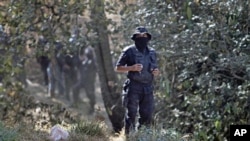More drug violence in Mexico in recent weeks is focusing new attention on that nation's anti-drug efforts, and U.S. cooperation in the fight. Mexican officials say soldiers uncovered a mass grave Tuesday containing at least 17 bodies in Guerrero. A recent attack on two U.S. immigration agents, killing one of them, is adding to concerns on both sides of the border. Some experts say progress will depend on bolstering Mexico's law enforcement and its courts.
A chilling reminder of the ever-present danger in the war on drugs unfolded in northern Mexico on February 15, when two U.S. immigration and customs agents were shot by gunmen while driving through northern Mexico. One agent died, the other was wounded.
That attack came during a recent surge in the violence among Mexico's rival drug gangs and is the latest incident adding to tensions between U.S. and Mexican officials.
In a recent interview in the Mexican newspaper El Universal, Mexican President Felipe Calderon again blamed the United States for not doing more to reduce the demand for drugs, or the flow of guns into Mexico.
Calderon also expressed anger about U.S. cables - leaked by the WikiLeaks website - in which U.S. diplomats gave unflattering assessments of the Mexican government's security efforts. He accused the diplomats of exaggerating their concerns to impress their bosses.
U.S. office of National Drug Control Policy Director Gil Kerlikowske said the United States has two key goals in the cross-border war on drugs.
"That goal of reducing violence is actually critical. The other goal that I would see as a marked measure of success would be to move away from the military doing policing and to have civilian policing that is not only able to handle the job, but civilian policing that is seen as trusted, professional and competent."
The Woodrow Wilson Center's Mexico Institute director, Andrew Selee, said the lack of credibility of police with the Mexican public is just one of several problems.
"Secondly, prosecutions - prosecutors tend not to take most of the cases to court. There is limited ability to gather evidence in a way that allows credible prosecutions and there is a lot of corruption within prosecutors' offices and people get off pretty easily. And finally there is the judicial system itself. The court system itself is not terribly credible. There is huge weight given to the prosecutors when they do bring a case in. Judges rarely see the defendants and it is very easy in many cases to buy off the clerks of the court," said Selee.
Selee said Mexico has undertaken what he calls good constitutional reforms to bolster the rule of law. He added that the United States can provide assistance in key areas, including police forensics and advice from American judges and prosecutors.
"I mean, a chance to have a dialogue with people to really help Mexican counterparts innovate in their job and develop the kind of pride in the work that they do - by working with their U.S. counterparts. And that is the kind of thing that is beyond what the U.S. federal government does. This is being done in many cases by local jurisdictions, by state prosecutors, by local prosecutors, by judges on their own initiative and it is a fabulous way for the two countries to work together on rule of law."
That emphasis on rule of law cannot come quickly enough in Mexico. Since Felipe Calderon became President in 2006 and began his crackdown on drug cartels, more than 34,000 people have been killed in Mexico.




